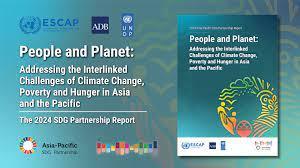
https://www.unescap.org/blog/entrepreneurship-and-innovation-face-climat...
The unique challenges posed to the Asia-Pacific region in the face of climate change, poverty and hunger are well known. The region plays a significant role in climate action as both the largest emitter of greenhouse gases on one end and home to the highest number of people most vulnerable to climate shocks on the other. In this way, the Asia-Pacific region stands at the forefront of global efforts to combat climate change and plays a pivotal role in shaping the future of our planet.
The 2024 ESCAP-ADB-UNDP SDG Partnership Report highlights how increasingly frequent climate hazards lead to reduced agricultural and labour productivity, loss of livelihoods, and human displacement. Transformative solutions which address the impacts of climate change on food security and poverty alleviation require the right enabling environment. The report identifies 6 common key enablers of transformative change, including innovation and entrepreneurship. Innovation and entrepreneurship can fast-track the spread of more effective and sustainable solutions that combat climate change whilst equally alleviating poverty and hunger by empowering communities and fostering economic development and environmental stability.
Indeed, the Asia-Pacific region has become a hotbed for environmental and social entrepreneurship, with a surge in initiatives that seek to address this motley of climatic, poverty and hunger impacts. From green technology and climate-smart practices to women and youth-led entrepreneurship, innovative solutions are sprouting across the region.
Green technology ventures
The development of green technologies, such as carbon capture, water purification and waste management solutions, is gaining traction. Entrepreneurs in the Asia-Pacific region are leading technological developments that address pressing environmental challenges. In India, Geographic Information Systems (GIS), such as the Agri-GIS application provides farmers with daily weather forecasts, satellite imagery-based-real-time crop and water assessments, crop suitability recommendations, market and price analytics, natural hazard alerts, and information about agricultural facilities and government programs straight to their smartphones. Developed by the New Centre for Spatial Analytical and Advanced GIS (C-SAG), this innovation advises 150,000 farmers in 532 villages in India. Innovative green tech such as this enhances access to knowledge and empowers farmers to make informed and accurate decisions around their farm operations practices and profits.
Climate-smart agriculture practices
Climate-smart agriculture approaches integrate agricultural strategies that target food security and climate change. In Uzbekistan, laser land levelling precisely levels farmland whilst reducing seed and water losses and limiting the need for fertiliser and pesticides. As part of its national strategy to foster water security and climate resilience in an otherwise water-scarce region, this laser land levelling innovation boosts yields as well as land use and irrigation efficiency. Other examples of climate-smart agriculture include collecting and repurposing crop residue to generate renewable biogas or even to produce bricks.
Women and youth climate entrepreneurship
Women and youth entrepreneurship is gaining momentum in the Asia-Pacific region and social enterprises led by women and youth have enormous potential to alleviate climate change impacts. Founded by a young female entrepreneur, the AGREA Agricultural Communities International Foundation has established learning sites to provide education, especially to youth and women in agriculture to enhance food resilience and eradicate poverty in farming and fishing families in the Philippines. Recently, ESCAP hosted a Youth Climathon, engaging youth from across the Asia-Pacific region to develop practical and innovative solutions to accelerate climate action in the areas of climate-smart agriculture, just transition and natural ecosystem restoration. Initiatives such as these effectively dismantle power structures and inequalities that reinforce women and youth's vulnerability to climate change, poverty and hunger. Women and youth-led business solutions are equally vital for creating inclusive green jobs and leaving no one behind.
What next?
Asia-Pacific entrepreneurship and innovations such as these are driving tangible change in the wake of climate change, poverty and hunger challenges. As we witness the surge of green technology ventures, climate-smart agriculture initiatives, and the rise of women and youth-led climate entrepreneurship within the Asia-Pacific region, it is clear that entrepreneurs from the region are not merely adapting to change but actively shaping a future defined by resilience, sustainability, and inclusivity by creating opportunities for economic development, environmental stability, education, and improved livelihoods.
Beyond the remarkable strides of innovators and entrepreneurs, support is needed from governments, the private sector and other partners to finance and scale up implementation. Governments are vital to facilitating multilateral and bilateral technology transfers and can equally provide broad encouragement for innovation ecosystems by creating an enabling environment that connects finance, technology, business, and customers. International organisations and multilateral development banks are in a good position to provide technical assistance for developing clean energy supply chains and innovation incubation. The private sector, civil society organisations and scientific research institutes also play pivotal roles in facilitating community awareness-raising and to help pilot, implement, and monitor effectiveness of social entrepreneurial initiatives aimed at addressing climate change, poverty and hunger. They also play a key role in leveraging opportunities for employment, education and skills development. Each of these actors must work with communities at different scales and levels to bolster entrepreneurial innovation within the Asia-Pacific region.
Discover more enablers of transformative change in the 2024 SDG Partnership Report.









